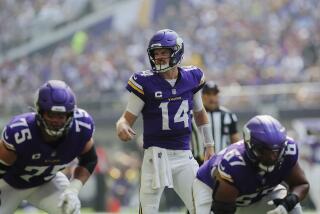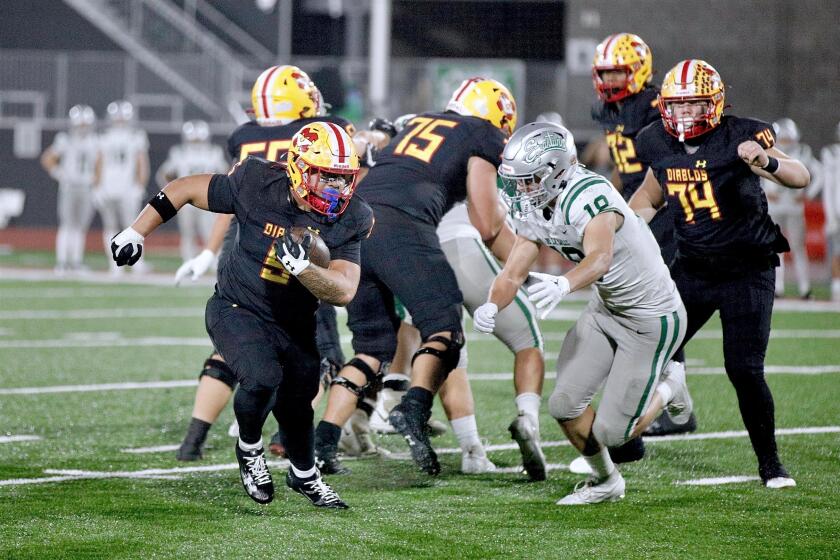PRO FOOTBALL ’92 : Eagles Are a Mystery Team : Cunningham Is Back, but Loss of Jerome Brown Will Hurt
For the Philadelphia Eagles, life in pro football this year could be either bad or beautiful. The Eagles are the NFL’s 1992 enigma. No other pro club carries more seeds of promise or, potentially, trouble. Or pressure.
It will be a Philadelphia Super Bowl this season, many are saying. They suggest that, for the first time, the Eagles can combine the NFL’s best defense with the game’s best running quarterback, Randall Cunningham, who missed last season because of a knee injury.
What’s the problem then?
Their critics concede that the Eagles had a great quarterback in 1990 and a great defense in 1991, but they warn that he may not be the same quarterback now, and that this isn’t the same defense. As a new season begins, it’s all a mystery.
How is the quarterback?
After an 11-month rehabilitation program, Cunningham started three exhibition games this summer and validated the inscription on his practice-day T-shirt, “He’s Back Scrambling.” Then, scrambling, he pulled a groin muscle, and missed the club’s dress-rehearsal exhibition last week.
And now?
As Cunningham goes, so go the Eagles--but as of their first game against the New Orleans Saints on Sunday, nobody knows which way he’s going.
Won’t their defense hold them up again?
During the off-season, the Eagles lost their most inspirational player, defensive tackle Jerome Brown, in a fatal car accident.
“Jerome was the heart and soul of our club,” his backup, Mike Golic, said.
How does a team react to such a tragedy?
The Eagles have dedicated the season to Brown, said all-pro defensive end Reggie White, adding that that alone could put them over the top. Conversely, though, Brown’s absence could put them out of the race. As the season begins, it’s a mystery.
Would a better offense compensate?
Needing new offensive linemen, the Eagles have, instead, brought in a new running back, Herschel Walker, 30, who in the exhibition season failed to improve the running game. And for the third time, on his third NFL club, Walker has divided a town and a team.
How?
“Herschel isn’t a great back. He disappears in big games,” said Eagle strong safety, Andre Waters, who disagrees with those among his teammates who agree in principle with Philadelphia writer Bill Lyon, who said: “Walker is far better than anything they now have. And he might end up better than anything they have ever had.”
As Walker begins his ninth pro season, he remains one of the NFL’s most nagging puzzles.
Do the Eagles have the right kind of leaders for these kinds of problems?
Owner Norman Braman has a superb track record in hiring coaches. His last choice, Buddy Ryan, built the team into an NFL power. His present coach, Rich Kotite, in his rookie season last year, survived the loss of four quarterbacks, Cunningham and Jim McMahon among them, and, with a fifth quarterback, led the Eagles to a 10-6 record.
There is hope then?
Well, there is controversy, too. During the NFL antitrust trial in Minneapolis this summer, witnesses testified that Braman’s 1990 salary was $7.5 million and that the club’s four-year profit in 1985-89 was a league-high $34.3 million.
That was upsetting to the Philadelphia players, who have been squeezed in salary negotiations, and it reportedly also upset the coaches, whose wages are, by far, the league’s lowest.
But Kotite hasn’t complained. He hasn’t, in fact, complained about anything, even though his salary is reportedly one-third of Don Shula’s at Miami--and one-half of David Shula’s at Cincinnati--and even though he lost Pro Bowl quarterback Cunningham in his first year as a coach, not to mention Pro Bowl defensive lineman Brown in his second.
“I always try to see a silver lining,” Kotite said. “Last year, the team realized how great it can be without Randall.
“Without Jerome, we’ll never stop grieving, personally. But professionally, Jerome has challenged us.”
The players keenly feel the challenge. They seem to feel more urgency than ever to win this year.
Said defensive star White, who will turn 31 during the season, “We’re not getting any younger.”
For the last five years, White, a Baptist minister, has been half of the firm of Brown & White, one of the NFL’s greatest tandems of defensive linemen.
“This is it for us,” he said, meaning the Eagles’ 1992 Super Bowl bid. “If we don’t do it this year, we may never do it. I don’t even want to think about next year. I can’t bank on next year any more.”
That’s urgency. That’s pressure.
JEROME’S LEGACY
Because this is the Eagles’ 60th season in the NFL, the players were going to put a 60 on their sleeves this year. Instead they are wearing a 99, Brown’s number.
But that isn’t good enough for Cortez Kennedy, the Seattle Seahawks’ young defensive lineman, who in his college days followed Brown into the lineup at the University of Miami.
Kennedy has switched his Seattle uniform number from 96 to 99.
“Jerome was my friend,” he said. “I’ll miss the 96, but not as much as I’ll miss Jerome. And I’ll have to play well. I know he doesn’t want me to embarrass him.”
Brown was 27 when his life ended in a car that, his teammates said, he was probably driving too fast. When the car planed, he probably exited laughing, they said. Jovial, reckless, he was always the life of the party.
He was the sole support of two sons by two Florida women. His 12-year-old nephew died with him.
At Brown’s funeral in Brooksville, Fla., his teammates remembered that, as one said, “Jerome hated neckties.” So at the cemetery, they all removed their ties, and put them on Brown’s casket.
A Philadelphia writer who was there, Kevin Mulligan, called it “a final zinger” for a seasoned practical joker.
Football people who didn’t know him well thought of Brown as a special kind of player, among the finest in the league. As Washington Redskin line coach Jim Hanifan said: “He wouldn’t be blocked. He solidified that entire defense.”
But to his teammates, Brown was a special kind of person.
Said center David Alexander, “He was outlandish and outspoken, but he kept everybody going in the right direction.”
In the Eagle locker room, which was like Brown’s throne room, they have kept his dressing stall intact. And the other day, wide receiver Fred Barnett, his eye on the locker room door, told Philadelphia writer Mark Bowden: “I keep expecting Jerome to come banging through, laughing at everybody, sayin’ he fooled us.”
Brown’s helmet and shoulder pads are still in his locker, along with his sweat socks, T-shirts, and seven pairs of shoes. His green game jersey, framed now, hangs on the back wall.
No one knows how this will all play out for the Eagles this fall when Brown, still very much on their minds, isn’t actually in their lineup.
“It’s going to be a tremendous blow to the (Eagles), not having Jerome there,” said Hanifan, a coach who couldn’t figure a way to block him.
But those who were at the funeral will never forget the massive presence of Reggie White. Grieving in a double-breasted black suit, White couldn’t fight back the tears.
At the end of the service, Philadelphia writer Dave Caldwell said, “White stood in front of Brown’s closed casket, clapping fervently, and rocking his broad shoulders to the soulful beat of a gospel song.”
The song? “We’re Gonna Make It.”
RANDALL’S TEAM
For Randall Cunningham, the 1992 football season began on March 22 in Las Vegas, where he played college ball. It began with a week of organized offensive drills at a camp that Cunningham ran himself.
Joining him were a Raider friend, Eric Dickerson, and four Eagle teammates--Keith Byars, Keith Jackson, Fred Barnett and Calvin Williams--who, after Cunningham’s year off, gave up a week of their off-seasons to help get him back in the groove.
Cunningham paid his teammates $5,000 apiece that week. He also picked up their expenses from air fare to board and room at the Sahara. “I insisted on the (financial arrangements),” he said. “They’d have done it free, but that wouldn’t have been fair.”
So he was ready for training camp.
And when the exhibition season began, he scrambled around like the old Cunningham until, in his third start, he pulled a muscle. He will be ready Sunday, he said. And when necessary, he will scramble.
The Eagles are a team with only one defensive question--who will back up Mike Golic with Golic replacing Brown?--but offensively, they only have one answer: Cunningham.
He is their offense--their passer, their runner.
Minus Cunningham, their three minor offensive problems become major:
--In a pedestrian offensive design, the Eagles lumber with any of their three other quarterbacks, even Jim McMahon.
--They can point to only one reliable performer in their offensive line, center David Alexander.
--They probably are expecting too much of Herschel Walker, who, more than most backs, needs the kind of blocking that he had one year in Dallas, but never before or since.
Walker disagrees.
“Look at my stats. I don’t think they’re bad,” he said, noting that his lifetime pro average is 4.5 and that he even averaged 4.2 at Minnesota, where they criticized him every day.
What Minnesota needed, though, and what the Eagles need, is a great back, not a not-bad back.
Even so, the Eagles remain a valid Super Bowl contender because of the strength that remains in their defense--from White and Waters to linebacker Seth Joiner--and because of their unusual leadership: quarterback Cunningham, coach Kotite, and owner Braman.
The club’s sole owner, Braman has proved to be the best businessman in pro football. According to Financial World, he made a $12.7-million profit in 1991 after paying himself $7.5 million in 1990.
The advantage to the Eagles is that only a financially sound ballclub is in position to make, when necessary, expensive moves.
Their field leader, Kotite, 49, is a kind of Vince Lombardi throwback who has made a winning NFL start by exercising total control.
Kotite, who has a master’s degree in business, is a friendly sort who is apparently easy to work with--as long as it’s on his terms.
“He gets loud and angry when things aren’t done his way,” said Philadelphia writer Bowden.
That worked, remember, for Lombardi.
Times editorial assistant Lauri Ferguson contributed to this story.
More to Read
Go beyond the scoreboard
Get the latest on L.A.'s teams in the daily Sports Report newsletter.
You may occasionally receive promotional content from the Los Angeles Times.










